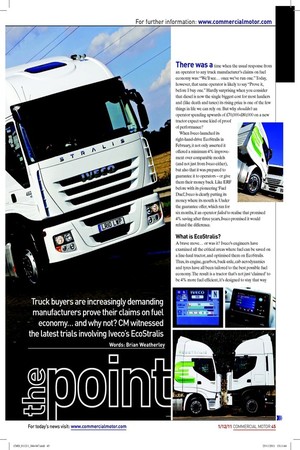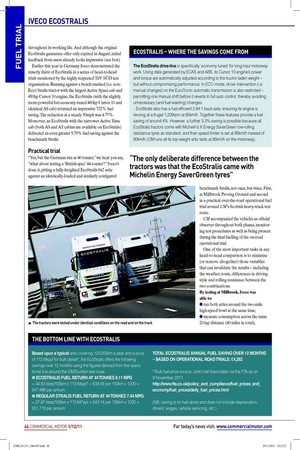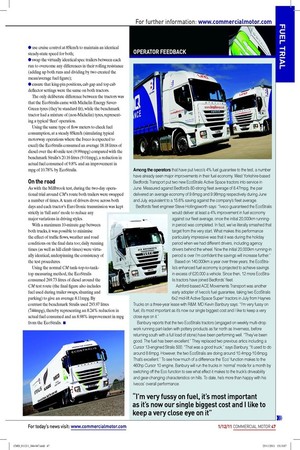Truck buyers are increasingly demanding manufacturers prove their claims on
Page 31

Page 32

Page 33

If you've noticed an error in this article please click here to report it so we can fix it.
fuel economy... and why not? CM witnessed the latest trials involving Iveco’s EcoStralis
Words: Brian Weatherley
There was a time when the usual response from
an operator to any truck manufacturer’s claims on fuel economy was: “We’ll see... once we’ve run one.” Today, however, that same operator is likely to say “Prove it, before I buy one.” Hardly surprising when you consider that diesel is now the single biggest cost for most hauliers and (like death and taxes) its rising price is one of the few
things in life we can rely on. But why shouldn’t an
operator spending upwards of £70,000-£80,000 on a new tractor expect some kind of proof of performance?
When Iveco launched its right-hand-drive EcoStralis in February, it not only asserted it offered a minimum 4% improve ment over comparable models (and not just from Iveco either), but also that it was prepared to guarantee it to operators – or give them their money back. Like ERF before with its pioneering ‘Fuel Duel’, Iveco is clearly putting its money where its mouth is. Under the guarantee offer, which ran for
six months, if an operator failed to realise that promised
4% saving after three years, Iveco promised it would refund the difference.
What is EcoStralis?
A brave move... or was it? Iveco’s engineers have examined all the critical areas where fuel can be saved on a line-haul tractor, and optimised them on EcoStralis. Thus, its engine, gearbox, back-axle, cab aerodynamics and tyres have all been tailored to the best possible fuel economy. The result is a tractor that’s not just ‘claimed’ to be 4% more fuel eficient, it’s designed to stay that way throughout its working life. And although the original EcoStralis guarantee offer only expired in August, initial feedback from users already looks impressive (see box).
Earlier this year in Germany Iveco demonstrated the miserly thirst of EcoStralis in a series of head-to-head trials monitored by the highly respected TUV SÜD test organisation. Running against a bench-marked (i.e. nonEco) Stralis tractor with the largest Active Space cab and 450hp Cursor 10 engine, the EcoStralis (with the slightly more-powerful but economy-tuned 460hp Cursor 10 and identical AS cab) returned an impressive 7.32% fuel saving. The reduction at a steady 50mph was 4.77%. Moreover, an EcoStralis with the narrower Active Time cab (both AS and AT cabins are available on EcoStralis) delivered an even greater 9.79% fuel saving against the benchmark Stralis.
Practical trial
“Yes, but the Germans run at 40 tonnes,” we hear you say, “what about testing a ‘British-spec’ 44-tonner?” Iveco’s done it, pitting a fully-freighted EcoStralis 6x2 artic against an identically-loaded and similarly conigured
benchmark Stralis, not once, but twice. First, at Millbrook Proving Ground and second in a practical over-the-road operational fuel trial around CM’s Scottish heavy-truck test route.
CM accompanied the vehicles as oficial observer throughout both phases, monitoring test procedures as well as being present during the inal fuelling of the on-road operational trial.
One of the most important tasks in any head-to-head comparison is to minimise (or remove altogether) those variables that can invalidate the results – including the weather, route, differences in driving style and rolling resistance between the two combinations.
By testing at Millbrook, Iveco was able to: ● run both artics around the two-mile high-speed bowl at the same time; ● measure consumption across the same 20-lap distance (40 miles in total); • use cruise control at 85km/h to maintain an identical steady-state speed for both; • swap the virtually identical spec trailers between each run to overcome any differences in their rolling resistance (adding up both runs and dividing by two created the mean/average fuel igure); • ensure that king-pin positions, cab gap and top cab delector settings were the same on both tractors.
The only deliberate difference between the tractors was that the EcoStralis came with Michelin Energy SaverGreen tyres (they’re standard it), while the benchmark tractor had a mixture of (non-Michelin) tyres, representing a typical ‘leet’ operation.
Using the same type of low meters to check fuel consumption, at a steady 85km/h (simulating typical motorway operations where the Iveco is expected to excel) the EcoStralis consumed an average 18.18 litres of diesel over the 40-mile test (9.99mpg) compared with the benchmark Stralis’s 20.16 litres (9.01mpg), a reduction in actual fuel consumed of 9.8% and an improvement in mpg of 10.78% by EcoStralis.
On the road
As with the Millbrook test, during the two-day opera
tional trial around CM’s route both trailers were swapped
a number of times. A team of drivers drove across both days and each tractor’s EuroTronic transmission was kept strictly in ‘full auto’ mode to reduce any major variations in driving styles.
With a maximum 10-minute gap between both trucks, it was possible to minimise the effect of trafic lows, weather and road conditions on the inal data too; daily running times (as well as hill climb times) were virtu ally identical, underpinning the consistency of the test procedures.
Using the normal CM tank-top-to-tank
top measuring method, the EcoStralis consumed 269.73 litres of diesel around the CM test route (the inal igure also includes fuel used during trailer swaps, shunting and parking) to give an average 8.11mpg. By contrast the benchmark Stralis used 293.97 litres (7.44mpg), thereby representing an 8.24% reduction in actual fuel consumed and an 8.98% improvement in mpg
from the EcoStralis. ■











































